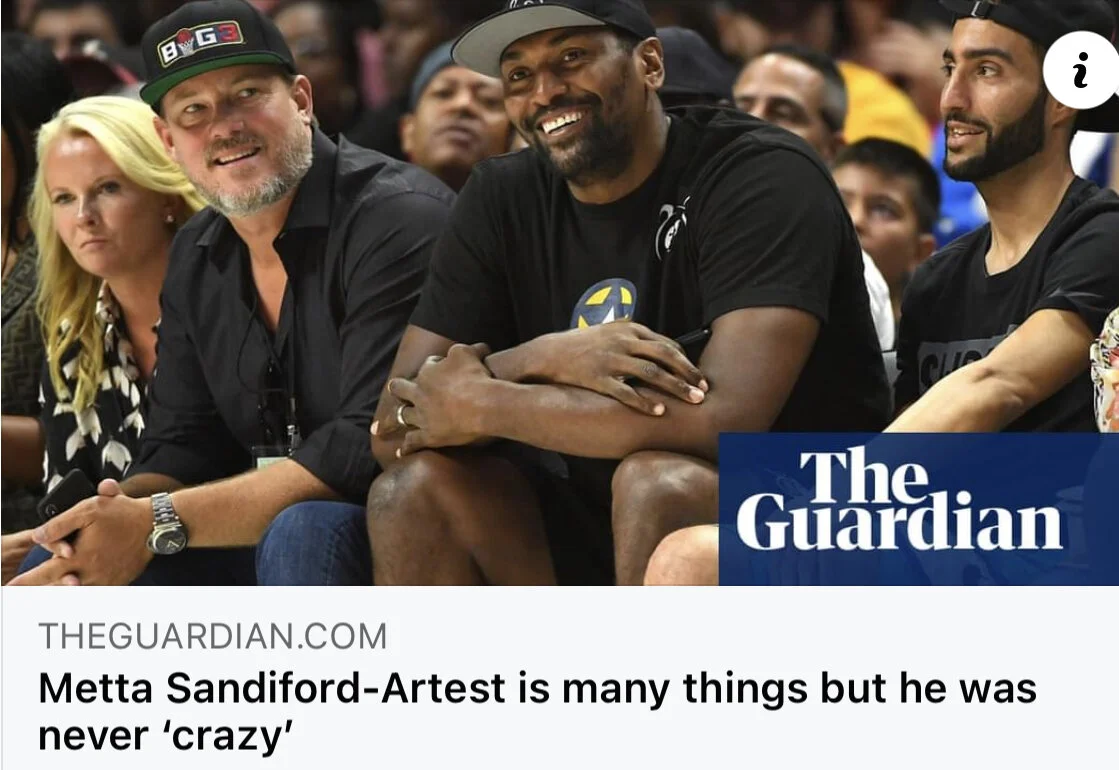In 2013 I was part of a trip put on by the NBA Players Association to Africa. Among my fellow players on the tour was none other than Metta Sandiford-Artest, then known as Metta World Peace. It was nearly a decade removed from The Malice At The Palace, when players and fans had fought at a game between the Detroit Pistons and Indiana Pacers. The NBA came down heavily on Metta, who was suspended for 86 games and fined $5m for his part in the incident.
On the trip, Metta and I talked a lot. We reminisced about our days in college, when my Syracuse team and his St John’s team battled on court. Metta was the same player in college as he was in the NBA: fiery and passionate. I asked him about an incident that stayed in my memory. When we beat St John’s in the dying seconds at Madison Square Garden, Metta approached one of the refs about a missed call. The ref shrugged him off and said something to the effect of: “The game is over, shut up and go home.”
Metta promptly lost it. He knocked over a TV camera and had to be restrained by players and security. At the time he reminded me of the Incredible Hulk, unable to control his fury.
In Africa, as he recalled his outburst at The Garden, Metta said those types of incidents happened throughout his life and he was working on it. Then he added something I’ll never forget: “I’m not crazy”. I told him I didn’t think that was the case, instead he reminded me of a superhero who wants justice but sometimes picks the wrong way of fighting for it. “Nobody has ever said it like that before,” Metta replied.
I understood why he would be upset in many instances. Don’t get me wrong, I’m not attempting to minimize disproportionate responses in any way shape or form. Indeed without the proper boundaries, guidance and tools needed to deal with unjust situations, a disproportionate response can be dangerous, especially as a Black man in America.
But now, almost two decades after he was excoriated on national TV for his role in The Malice At The Palace, Metta has rebounded from issues with his temper and mental health, and has done the difficult work to not only save himself, but to help others.
I remember after he won the championship with the Los Angeles Lakers in 2010, one of the first things he did was thank his psychologist, Dr Santhi Periasamy.
To give context for that comment, back then, an athlete admitting any type of mental health issue was opening himself up for endless ridicule, from fans and the more unkind sections of the media. According to Johns Hopkins University, around 25% of American adults suffer from a diagnosable mental disorder in a given year. But the ridiculous theory runs that fame and money somehow insulate athletes from human suffering.
Indeed, athletes themselves were not always aware of how mental health could affect their own teammates. I recently interviewed Metta’s former teammate Jermaine O’Neal to discuss his documentary about The Malice At The Palace. O’Neal opened up about how much he regrets not being aware of the mental health issues Metta was struggling with at the time.
“I was young. I did not know anything about mental health. I wasn’t mature enough to understand what this man was going through. While we [were] worrying about wins and losses, [Metta] was worried about how he’s going to handle his life daily,” O’Neal told me on my podcast, The Rematch.
These days, teams take mental health much more seriously than when Metta and I played. The NBA and NFL both require teams to have mental health professionals on staff, a policy that was pretty much non-existent 20 years ago. Unfortunately, loudmouths such as Piers Morgan and Megyn Kelly never miss an opportunity to embrace their inner bully and attack playerssuffering from mental health issues. In fact, Kelly has gone as far as criticizing the US Open for providing “quiet rooms” for tennis players struggling mentally, proof – if any was needed – that her own inner mean girl is alive and well.
Nowadays, Metta has become a mental health advocate. He travels the country educating people on mental health. He encourages young people dealing with mental health challenges that they are not “crazy” but that with the proper coping techniques they can lead a very productive life. He even auctioned off his NBA championship ring and donated hundreds of thousands of dollars of the proceeds to charities across the US.
“I believe in … providing kids with someone to talk to because it’s so expensive. I pay for parenting counseling, marriage counseling and anger management, and it’s very expensive,” he told ESPN in 2010. “This will be for children of all demographics, rich or poor – preferably the rich can pay for their own psychologists – but it’ll be a great way to help kids who don’t know where they’re going in their life at this point.”
Metta’s former coach at St John’s, Mike Jarvis, said he has seen his former player’s growth.
“It makes me feel proud, and honored, and blessed to have had the opportunity to work with him and to learn from him,” Jenkins told me for my show, The Collision. “He is not crazy like people tried to label him, this is part of his mission. God has put him in a position where he can help other people. So I’m really happy for him and I am proud of what he is doing and I hope and pray that he will continue to let his light shine.”
I couldn’t agree more.

